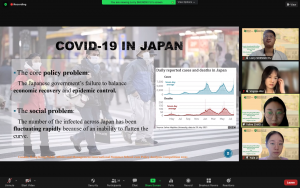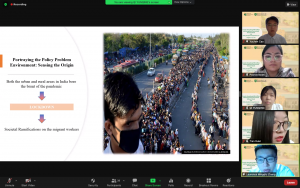Canada-Hong Kong Public Affairs and Management International Summer School Held in EdUHK

The Inaugural edition of the Canada-Hong Kong Public Affairs and Management International Summer School cum Policy Analysis Competition 2021 took place from August 16 to 23, 2021. It was co-organised by the Department of Asian and Policy Studies at The Education University of Hong Kong (EdUHK) and the Johnson Shoyama Graduate School of Public Policy, University of Saskatchewan (USask).
Given the pandemic and difficulties in air travel, the Programme took place virtually, with speakers and students logging in from territories across the globe – Canada, Mainland China, Hong Kong, India and Singapore. The unique format of the Programme was cited by students as one of its major draws. The first five days were devoted to faculty-led sessions in the mornings, which introduced students to various facets of public affairs and public management in different sectors around the world. These were complemented by tutorials and student cafés in the afternoon that focussed on policy analysis activities. The morning sessions featured academic faculty from EdUHK, USask, University of Regina, and Simon Fraser University as well as invited guests that were current and former public service practitioners. By adopting varied formats, including seminars, workshops, a movie screening and case studies; students gained insight and developed skills to understand real-world issues on a range of topics spanning – health, climate change, policy analysis, refugee issues, urban governance, eco-tourism, human resources management, data use; to name a few.
These sessions served as preparatory ground for the Policy Analysis Competition, which marked the culmination of the Programme. Teams were tasked with choosing a territory or country for which they had to define a pressing problem(s) with respect to COVID-19, diagnose its causes, evaluate the government response and make policy recommendations. Teams had the next 48-hours to organise themselves, choose their respective cases, undertake relevant research and prepare a presentation. The two teams winning the first prize and the first runner-up focussed, respectively, on Japan’s struggles in balancing economic recovery with curbing COVID-19 transmission and the issue of migrants in India during the pandemic-induced lockdown. The Programme received a very positive response. In their feedback, students appreciated it for the high level of professional organisation and for the introductory primer it provided on different policy topics. Other participants remarked upon the exceptional degree of international interaction and the excellent speakers. Most encouraging were the words of a student that noted the Programme ‘stimulated autonomy while guiding students to learn to incisively analyse public policy’.















